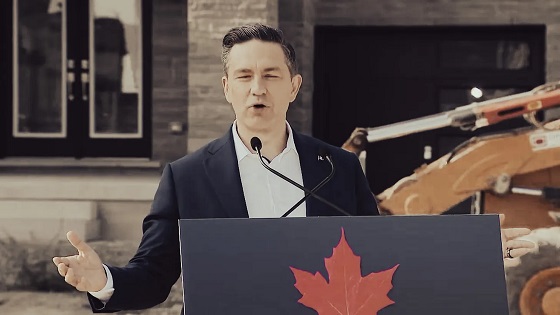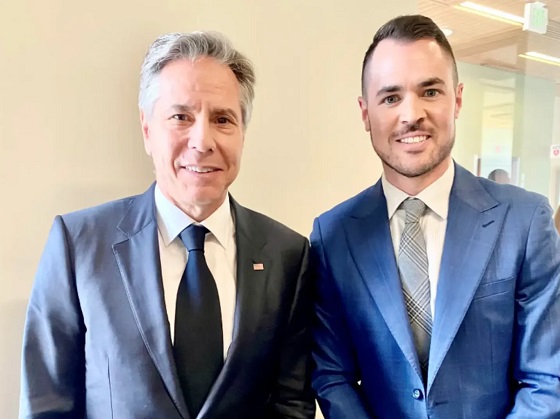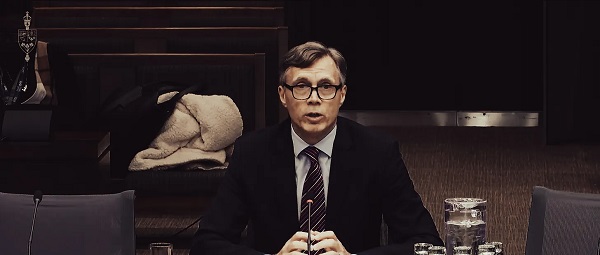Immigration
Conservatives blame Liberals for allowing man on UK child sex offender list to enter Canada

From LifeSiteNews
A Pakistani man was granted a visa in 2023 under former Prime Minister Justin Trudeau’s government after hiding that he was found guilty of sexually abusing his underage niece.
Canada’s Conservative Party blasted the federal Liberal government’s immigration department after it came to light that a Pakistani man on the U.K.’s sex-offender list was granted a visa to come to Canada
Gullfam Hussain, who was found guilty of sexually abusing his underage niece, arrived in Canada in 2023 on a visitor’s visa even though he had spent time in jail for his crimes but did not finish his sentence.
Conservative MP Michelle Rempel Garner blasted Canada’s current Justice Minister Sean Fraser, who was immigration minister in 2023 under former Prime Minister Justin Trudeau, for the gaffe.
“This is truly disgusting and is antithetical to what it means to be Canadian,” Rempel Garner noted during a question period in the House of Commons last week.
“The person who allowed this incestuous child sex abuser into Canada should be fired.”
Rempel Garner stressed that Hussain should have not been allowed into Canada in the first place.
“Why did the prime minister (Mark Carney) promote the then-immigration minister, who allowed an incestuous child sex abuser into Canada, to the minister of justice?” she asked.
According to court documents, only now are Canadian officials trying to deport Hussain for what they deemed “serious criminality and misrepresentation” because he lied on his visa application.
Records show that Hussain claimed protected person status last year, saying he was at risk of “honour crimes from his family members in Pakistan” should he be sent back to his home country. He was denied his request for protected status.
As for Fraser, he was not in the House of Commons to answer Rempel Garner’s questions. Public Safety Minister Gary Anandasangaree stated that the Canada Border Services Agency is working to ensure that criminals can’t enter Canada.
As for Hussain, Rempel Garner noted how he was put on the U.K.’s sex offender registry because he had engaged in “incestuous sex” with his young niece, who was between age 13 and 17. Hussain is 10 years older than the girl.
A court found him guilty of adult sexual activity with a minor and he was sentenced in 2017 to six years in jail. However, he was let go in 2020 and fled to Spain without serving the rest of his sentence.
Records show his niece later joined him, and they had a child in 2022 before he came to Canada in 2023.
“He did not disclose his criminal history on his Canadian visa application or upon his entry to Canada,” the court documents read.
When it comes to immigration under Trudeau and now Carney, Canada has allowed millions into the country, many from Muslim nations, including so-called LGBT “refugees,” which calls into question just how well people are being screened.
Business
Poilievre: “Carney More Irresponsible Than Trudeau” as Housing, Jobs, and Energy Failures Mount

50,000 lost manufacturing jobs, 86,000 more unemployed, soaring housing costs, and blocking every LNG project while vowing to end the TFW program
Pierre Poilievre opened his press conference with a direct attack on Mark Carney and the Liberal record on housing, framing the crisis as the product of government mismanagement rather than market forces.
He began by pointing to Conservative MP Scott Aitchison, a former mayor, as an example of what can be done when local leaders “cut the taxes and the development charges and the wait times so that building can happen.” Then came the pivot: “What a contrast with Justin Trudeau — excuse me, with Mark Carney,” he said, before slamming Carney’s choice of Gregor Robertson as housing minister. Robertson, he reminded the crowd, presided over a 149% increase in Vancouver housing costs and more than doubled homebuilding taxes. Carney, Poilievre said, rewarded that record by handing him the national housing file.
The setting itself — Deco Homes, a family-run builder founded by Italian immigrants — was chosen deliberately. Poilievre praised the Gasper family for their role in building Canada’s homes and businesses, but then asked whether such families could do the same today. His answer was no. “After a decade of Liberal taxes, Liberal spending, out-of-control Liberal immigration, reckless crime policies… the Canadian promise is really broken.”
From there, he broadened the attack. He spoke of an entire generation priced out of homeownership, of immigration growing “three times faster than housing and jobs,” of crime rising, and of what he called “the worst economy in the G7.” And then he turned squarely on Carney: “Mr. Carney is actually more irresponsible than even Justin Trudeau was,” citing an 8% increase in government spending, 37% more for consultants, and 62 billion dollars in lost investment — the largest outflow in Canadian history, according to the National Bank.
The message was simple: Liberals talk, Conservatives build. Poilievre painted Carney as a man of speeches and promises, not results. “The mistake the media is making is they’re judging him by his words rather than his deeds,” he said.
It was an opening statement designed less to introduce policy — those details came later — and more to frame the battle. For Poilievre, Carney isn’t just Trudeau’s replacement. He’s Trudeau’s sequel, and in some ways worse.
During the Q and A portion of the presser; Pierre Poilievre was pressed on immigration today, and what he said was blunt. Canada, he argued, once had the “envy of the world” system: immigrants came in at numbers the country could absorb. There were jobs, housing, health care. Everyone integrated. Ten years later? He says the Liberals have destroyed that.
The facts he used were stark. According to Poilievre, Canada is bringing in people three times faster than homes and jobs are being created. He accused the government of allowing “massive abuses” of the international student program, the Temporary Foreign Worker program, and asylum claims, with what he called “rampant fraud” right under Ottawa’s nose.
He tied this directly to the economy: youth unemployment, he said, is the worst in three decades. At the same time, employers are importing more temporary foreign workers than ever, this year at a record high and using them for cheap labor under poor conditions. His line: “While our young people can’t find jobs, employers are able to exploit temporary foreign workers by giving them lower wages and terrible working conditions.”
But here’s the part that stands out politically. Poilievre said, “Immigrants are not to blame.” He put the responsibility squarely on Liberal governments, calling their immigration numbers “reckless and irresponsible.”
His fix? End the Temporary Foreign Worker program. Cut immigration levels back to “the right numbers and the right people” to fill jobs Canadians can’t do. Tighten border standards to keep criminals out. And, in his words, “always and everywhere put Canada first.”
Pierre Poilievre didn’t hold back when asked about Mark Carney’s record. His words: “Mr. Carney is actually more irresponsible than even Justin Trudeau was.” That’s not a throwaway line, he backed it with numbers.
According to Poilievre, Carney inherited what he called a “morbidly obese government” from Trudeau and made it worse: 8% bigger overall, 37% more for consultants, and 6% more bureaucracy. He says Carney’s deficit is set to be even larger than Trudeau’s.
Then the jobs number: 86,000 more unemployed people under Carney than under Trudeau. That, Poilievre argued, is the real measure, not the polished speeches Carney gives. His line: “The mistake the media is making is they’re judging him by his words rather than his deeds.”
He also went after Carney for what hasn’t happened: “He has not approved a single major national project.” Meanwhile, Poilievre says food price inflation is even worse today, crime policy hasn’t changed the same “catch and release” approach and every big promise Carney made has already been broken.
Pierre Poilievre was asked about Ukraine, and his answer wasn’t about speeches or handshakes in Brussels. It was about pipelines.
“The best way to put Canada first while helping Ukraine is to sell our oil and gas in Europe.” His argument: Vladimir Putin bankrolls his war because Europe still buys his fuel. Poilievre said if Canada had built the Energy East pipeline, we’d be shipping a million barrels of oil a day to Europe right now.
He went further: approve LNG plants immediately, liquefy tens of billions of dollars of Canadian gas, and ship it overseas to “fully displace” Russian sales. His line: “Instead of the money going to Putin’s war machine, it will go to the trades workers in this country.”
And then the indictment of the Liberals: “Mark Carney and the Liberals have blocked every single LNG project that has been put before them. As a result, we only have one plant and it was approved by Stephen Harper.”
So the contrast is stark. Carney talks about climate virtue. Poilievre says: build pipelines, sell fuel, kill Putin’s war economy, and pay Canadian workers. His closer: “That is how you put Canada first.”
Final Thoughts
So let’s just be honest. Under Mark Carney’s leadership, the numbers aren’t just bad they’re devastating. In a matter of months, Canada has lost 50,000 manufacturing jobs. These are not low-skill jobs; they are the backbone of the economy, the kind of work that built the middle class in this country. Add to that another 86,000 unemployed overall compared to when he took office. This is what Carney calls stability.
Now, if you’re a Temporary Foreign Worker, life looks pretty good. Ottawa has built an entire system around you cheap wages, little recourse, and companies happy to import you as disposable labor. If you’re a Carney insider, it looks even better. The government is 8% bigger than when Trudeau left, consultants are raking in 37% more, the bureaucracy is swelling. It’s one of the greatest insider rackets in modern Canadian politics.
But if you’re part of Canada’s middle class, if you’re a young person trying to buy a home, if you’re a worker trying to hold onto a job in a plant, a mill, or a construction site you are being hollowed out. You’re watching your wages stagnate, your housing costs explode, your jobs disappear overseas or into government-mandated “green transitions.” And when you ask for answers, what do you get? You get Patty Hajdu telling you not to be afraid of robots. You get Mark Carney telling you his deficits are “investments.” You get speeches about “climate virtue” and “AI literacy” while your livelihood collapses.
That’s the contrast Poilievre is trying to draw. On immigration, he says: let’s end the Temporary Foreign Worker scam, bring people in at a pace we can actually house and employ, and put Canadian workers first. On energy, he says: build the pipelines, approve the LNG projects, and stop funding Putin’s war by leaving Europe dependent on Russian fuel. On the economy, he says: stop measuring success by the size of government or the smoothness of a prime minister’s speeches, and start measuring it by the number of Canadians who can work, buy homes, and raise families in their own country.
So the choice is simple. Carney offers more of the same consultants, insiders, deficits, slogans, and the slow managed decline of a once-prosperous nation. Poilievre is offering something completely different: a chance to reverse the hollowing out of the middle class and to put Canadian jobs, Canadian energy, and Canadian sovereignty first.
If you’re an insider, Carney’s Canada works just fine. If you’re a middle-class Canadian, it’s a disaster. And that, in the end, is the dividing line in this country.
Subscribe to The Opposition with Dan Knight .
For the full experience, upgrade your subscription.
Business
Canada’s Real Estate Economy, Fueled by Mass Immigration and Offshore Cash, Is Unsustainable, Mayor Brad West Warns

Port Coquitlam Mayor Brad West meets with U.S. Secretary of State Antony Blinken in 2023 to discuss American concerns over fentanyl trafficking and money laundering tied to transnational crime groups operating in British Columbia.
“Billions upon billions” poured into land speculation have turned B.C. housing into a magnet for global money and mass migration, Mayor Brad West writes in an exclusive Op-Ed for The Bureau.
By Brad West
British Columbia, and much of the country, is confronting the consequences of an economic model that was never built to last. For years, we have been told a comforting story about growth — that as long as cranes dot the skyline and property values climb, prosperity will follow. But beneath that veneer lies a stark truth: our economy is not driven by value-added manufacturing, groundbreaking technology, innovation, or by unlocking our vast natural resource potential. It is built almost entirely on real estate and relentless population growth driven by mass immigration. And it relies on the building and selling of homes to the next wave of newcomers.
This is not diversification. This is dependency. And like all dependencies, it eventually demands a price.
In the not-too-distant past, B.C.’s prosperity came from sectors that created enduring value: forestry and mining that supplied the world; fisheries that sustained communities; manufacturing that turned raw materials into products; and, in more recent years, tech companies that could compete globally.
Today, those industries are shadows of their former selves in our economic mix — thanks, in part, to the strangulation of over-regulation and inordinately lengthy approval processes easily weaponized by those ideologically opposed to resource extraction. Their demise is not a naturally occurring phenomenon — and it is reversible — but it reflects the agenda and decisions of policymakers. In their place, real estate has become the dominant force, representing nearly 30 percent of B.C.’s GDP with its ancillary sectors. That’s a hell of a lot of eggs in a single basket, and the province’s balance sheet has become frighteningly tied to this cycle.
As the government oversaw this reorganization of the economy, it sent out the proverbial bat signal that investment capital didn’t belong in business development, but in land. Message received. Billions upon billions poured into bidding up land prices. Among the many consequences of this misallocation of capital are high land values squeezing out industrial employers and gnawing away at industrial land, weakening our capacity to make and export things. Today, industrial land makes up barely 4 percent of Metro Vancouver’s landmass.
Mass Immigration as Fuel for the Model
This new growth machine runs on people — specifically, the rapid influx of newcomers. In theory, immigration is a tool to strengthen an economy, replenish a workforce, and foster innovation. But in practice, B.C. and Canada have relied on it as the primary fuel for real estate demand. In 2023 alone, Canada added 1.27 million people — the most in 66 years, and almost entirely through immigration. No other G7 country comes close.
The country’s notorious Temporary Foreign Worker Program and unprecedented number of international students have figured prominently in this surge. Programs once intended to fill specific gaps or foster academic exchange have morphed into de facto population pipelines.
It’s all about feeding the beast: bring in more people than the market can comfortably absorb, then build and sell homes to meet the stimulated demand. Rising prices are framed as a sign of economic health, when in reality, they are a sign of scarcity and strain. In B.C., the government has clung to this model by throwing community planning out the window with legislation that overrides local decision-making and forces blanket upzoning without regard for infrastructure capacity or livability.
But all the smoke and mirrors in the world can’t obscure the reality. Hospital emergency rooms close not sporadically, but routinely. More and more students are educated in portables rather than properly resourced schools. Infrastructure — from roads and public transit to sewers and utilities — is under immense strain. It was never designed for the pace of expansion we’ve seen, and the costs of playing catch-up are staggering.
And still the cycle continues — because without that constant flow of new buyers, the whole structure starts to wobble. And wobbling it is.
Ponzi Economics: Why B.C.’s Housing Foundations Are Failing
To call this a Ponzi scheme is not to say it is literally fraudulent in the legal sense. But the comparison is apt: returns for current “investors” depend on recruiting new participants at ever-higher prices. The moment the influx slows, the math stops working.
We’ve seen this movie before. Jurisdictions from Ireland before the 2008 crash, to parts of Spain’s coastal boom towns, to U.S. “Sun Belt” cities in the lead-up to the subprime meltdown — all rode a similar wave. And when it broke, the fallout was severe: construction job losses, collapsing home values, public finances in crisis, and a wave of personal bankruptcies.
In B.C., the warning lights are already flashing. Housing sales have cooled. Developers are shelving projects. Construction employment, once a driver of job growth, is faltering. Debt loads — both personal and governmental — are dangerously high. In the case of the Government of British Columbia, that would be a historic $133 billion. Youth unemployment in the province reached 14.6 percent in July — the highest level since September 2010.
Meanwhile, the sectors that could cushion a downturn — manufacturing, technology, value-added resource development — suffer from the province’s unilateral disarmament.
Let’s be honest: status quo politicians have taken us too far down this road to turn back without consequence. The damage is already being felt — and more is coming. But that doesn’t mean we can stay the course. We must act deliberately, and with purpose, to shift away from an economic model where our primary export is real estate, toward one where we build and produce the goods, technology, and services the world actually needs.
The turnaround won’t be easy, and it won’t be quick. But the longer we wait, the higher the cost of inaction. That means unshackling our resource sectors from endless regulatory gridlock so they can innovate and compete. It means investing in productivity-enhancing infrastructure, research and development, and the skills of our own workforce. And it means having an honest conversation about immigration levels — balancing economic benefits with our capacity to house and integrate new arrivals without fueling a speculative frenzy.
B.C. can either confront these realities now, or wait until the market forces a reckoning upon us. One path allows for a managed, strategic shift toward long-term prosperity. The other leaves us at the mercy of the same “house of cards” economics that has collapsed elsewhere — only this time, we will have no one to blame but ourselves.
Brad West is the Mayor of Port Coquitlam, British Columbia.
-

 National1 day ago
National1 day agoCanada’s birth rate plummets to an all-time low
-

 Agriculture2 days ago
Agriculture2 days agoCarney’s nation-building plan forgets food
-

 Fraser Institute2 days ago
Fraser Institute2 days agoAboriginal rights now more constitutionally powerful than any Charter right
-

 Business1 day ago
Business1 day agoElon Musk announces ‘Grokipedia’ project after Tucker Carlson highlights Wikipedia bias
-

 Alberta2 days ago
Alberta2 days agoAlberta puts pressure on the federal government’s euthanasia regime
-

 Crime1 day ago
Crime1 day agoPierre Poilievre says Christians may be ‘number one’ target of hate violence in Canada
-

 Business2 days ago
Business2 days agoDemocracy Watch Drops a Bomb on Parliament Hill
-

 Red Deer1 day ago
Red Deer1 day agoThe City or Red Deer Financial Troubles: The Role of Good Governance, Effective Policies and Key Performance Metrics.










